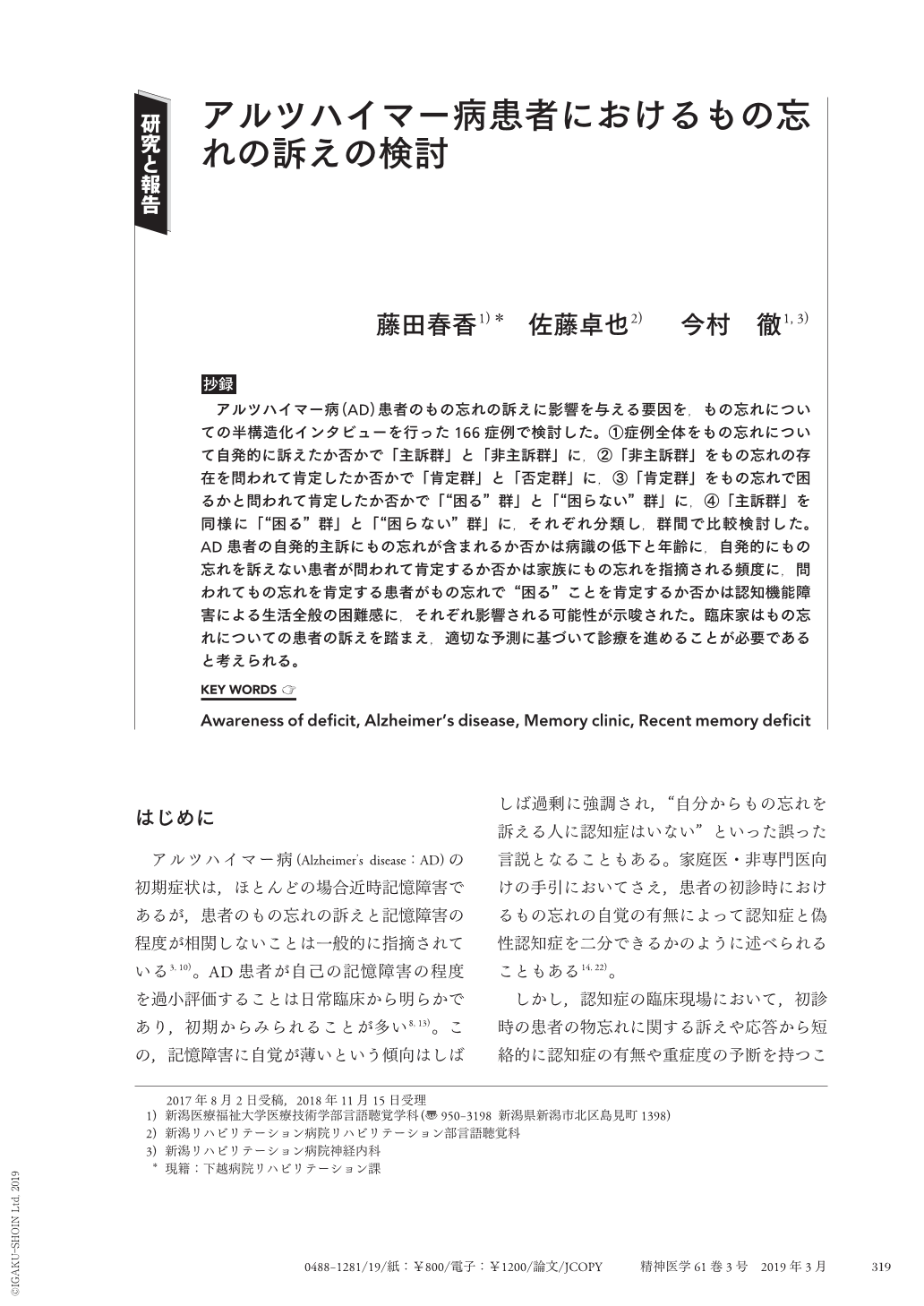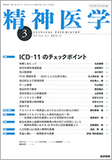Japanese
English
- 有料閲覧
- Abstract 文献概要
- 1ページ目 Look Inside
- 参考文献 Reference
抄録 アルツハイマー病(AD)患者のもの忘れの訴えに影響を与える要因を,もの忘れについての半構造化インタビューを行った166症例で検討した。①症例全体をもの忘れについて自発的に訴えたか否かで「主訴群」と「非主訴群」に,②「非主訴群」をもの忘れの存在を問われて肯定したか否かで「肯定群」と「否定群」に,③「肯定群」をもの忘れで困るかと問われて肯定したか否かで「“困る”群」と「“困らない”群」に,④「主訴群」を同様に「“困る”群」と「“困らない”群」に,それぞれ分類し,群間で比較検討した。AD患者の自発的主訴にもの忘れが含まれるか否かは病識の低下と年齢に,自発的にもの忘れを訴えない患者が問われて肯定するか否かは家族にもの忘れを指摘される頻度に,問われてもの忘れを肯定する患者がもの忘れで“困る”ことを肯定するか否かは認知機能障害による生活全般の困難感に,それぞれ影響される可能性が示唆された。臨床家はもの忘れについての患者の訴えを踏まえ,適切な予測に基づいて診療を進めることが必要であると考えられる。
Objective:To investigate factors affecting complaint of memory deficit at the first consultation in patients with Alzheimer's disease(AD). Subjects:166 AD patients who underwent a semi-structured interview about their memory deficit for the first presentation. Methods:Based on the responses to the interview,(1)total patients were classified into either of the 2 groups with or without chief complaint of memory deficit,(2)the patients without chief complaint of memory deficit were classified into either group with affirmation or denial of their memory deficit,(3)the patients who affirmed their memory deficit were classified into either group with affirmation or denial of their daily memory problems, and(4)the patients with chief complaint of memory deficit were also classified into either group with affirmation or denial of their daily memory problems. In each of(1)to(4)above, we compared the patients' demographic, disease and cognitive characteristics between two groups. Results:The patients with chief complaint of memory deficit showed significantly higher MMSE score and lower age than did the patients without chief complaint of memory deficit. The patients with affirmation of their memory deficit had significantly larger number of family members living together than did the patients with denial of their memory deficit. The patients who affirmed both of their memory deficit and daily memory problems showed significantly worse performance on digit span backward and lower index of everyday memory function compared to the patients who affirmed their memory deficit and denied their daily memory problems. Discussion:The age and the decreased insight of dementia in AD patients are suggested to affect whether their complaints include memory deficit or not. In the patients without spontaneous complaint of memory deficit, the frequency at which their family members point out their memory deficit may affect whether they affirm their memory deficit or not. In the patients who affirm their memory deficit when asked, their discomfort about their daily living may relate to their affirmation of the problems due to their memory deficit. Conclusion:According to memory complaint of AD patients, we can appropriately predict their cognitive and psycho-social characteristics.

Copyright © 2019, Igaku-Shoin Ltd. All rights reserved.


